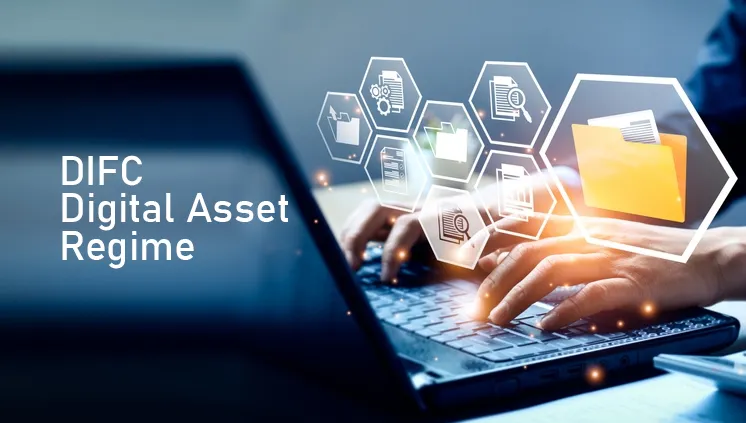The Dubai International Finance Centre (DIFC) is a global financial hub, fostering connectivity between the MEASA region and the economies of Asia, Europe and the Americas through Dubai. It provides an efficient and streamlined medium for businesses and financial institutions to establish connections with worldwide transformative markets within the region. DIFC is committed to establishing a future-focused regulatory framework that facilitates comprehensive technologies. The introduction of Digital Assets in the workspace has led to the development of decentralised finance platforms, smart contracts, cryptocurrencies and innovative blockchain applications. However, the rapid development of Digital Asset applications has also raised regulatory and security concerns, leading to ongoing efforts to establish frameworks that provide legal clarity and protect customers and investors. This essay will focus on the regulatory framework surrounding digital assets in the DIFC, examining the current laws and prospective legislative proposals.
The Dubai Financial Services Authority (DFSA) and The Dubai International Financial Centre Authority (DIFCA) supervise Digital Assets Regulation in the DIFC. A digital asset can be anything stored digitally and adds value. DFSA has implemented a regulatory framework specifically for Crypto Tokens. These regulations focus on safeguarding investors and consumers, ensuring market integrity and managing risks related to Anti-Money Laundering and Counter – Terror Financing (AML/CFT). Authorised firms and individuals within the DIFC’s jurisdiction can trade or hold Crypto Tokens, enabling them to provide financial services such as investments, transaction advice and portfolio management. However, the DFSA currently does not recognise or regulate a wide range of Digital Assets. The DIFC is, however, considering a comprehensive ‘Digital Assets Law’ (DAL) to address the evolving landscape covering Cryptocurrencies, NFTs, Stablecoins, Security Tokens and more. The proposed law will mainly focus on acknowledging Digital Assets as a form of property and designating a legal framework for them. This aims to establish legal certainty for Digital Assets within the DIFC’s jurisdiction.
The integration of Digital Assets in our daily lives has been constantly evolving and expanding. Therefore, countries around the World are engaging in formulating laws to incorporate Digital Assets into their legal systems. The European Union Parliament recently passed ‘Markets in Crypto Assets’ (MiCA), proposing to govern the usage of Digital Assets. Brazil, Australia, Mexico and Japan have demonstrated clear regulatory frameworks for Digital Assets. Similar approaches are anticipated to be embraced by more countries, indicating a growing acknowledgement of Digital Assets. Likewise, DIFCA has also put forth its own Digital Assets Law (DAL) for public feedback through Consultation Papers, drawing on insights from diverse professional fields. The goal is to offer legal clarity for investors and users of emerging technologies. The law is expected to be officially launched early next year, incorporating Digital Assets into the legal framework and aligning it with the global standards.
Digital Assets Law – Consultation Paper No. 4 of 2023: Outlines crucial facts and significant modifications proposed in DAL. Digital Assets offer prominent career opportunities by significantly increasing the market prospects. However, this can expose individuals to monetary and cyber threats. Therefore, there is an imperative to oversee and control the broader practical implementations of Digital Assets to ensure the safety and well-being of the public. Consultation Paper No. 4 proposes applications and consequences for implementing and using Digital Assets, creating a firm legal framework. DIFC’s proposal to regulate the digital assets sector shows its commitment to include upcoming technological innovation and advancements. Similarly, laws may also experience steady adaptations to accommodate future inventions.
Law of Security – Consultation Paper No. 5 of 2023: Global developments in transaction laws have prompted the DIFC to propose new regulations. DIFC seeks to amend its existing Security Law by drawing inspiration from international models, notably UNCITRAL’s Model Law on Secured Transactions. The proposed law will be aligned with international standards and offer clarity on securing Digital Assets. Simultaneously, DIFC plans to abolish the current ‘Financial Collateral Regulations’, comprising appropriate related provisions under the proposed Security Law. This approach ensures specificity to DIFC regulations while promoting compliance with international best practices.
The Chief Legal Officer of DIFC, Mr. Jacques Visser said, “DIFC is excited to announce a proposed new Digital Assets Law and new Law of Security regime. DIFC has been working closely with experts in the field of digital assets and banking and finance to create a global, ground-breaking Digital Assets Law, and in doing so, proposes a significantly enhanced and updated Law of Security regime…..” Previously, DIFC and DFSA’s supervision of Digital Assets were restricted. However, the forthcoming regulations are anticipated to change and strengthen control by enclosing necessary regulatory measures. The consultation documents demonstrate multiple amendments to existing DIFC laws like Contract Law, Trust Law, Foundation Law and more. These modifications will transit over different aspects of private laws to renew and acclimate to new changes in the jurisdiction.
In conclusion, creating adaptable laws that swiftly reflect and respond to societal changes is a bold step towards DIFC’s digitalisation goals, strengthening its position as an innovation hub. Digital Asset Regulations initiative establishes the UAE (and DIFC) as a leading Middle Eastern Country embracing technological advancements. This provides legal certainty and a welcoming environment for businesses to establish themselves on the rapidly expanding opportunities in the digital landscape.
References:
- https://www.difc.ae/who-we-are
- https://www.difc.ae/business/establish-a-business/digital-assets
- https://www.investopedia.com/terms/d/digital-asset-framework.asp
- https://www.dfsa.ae/alerts/statement-crypto-assets
- https://www.difc.ae/whats-on/news/difc-announces-consultation-new-digital-assets-law-new-law-security
- https://10leaves.ae/publications/blockchain-crypto/setting-up-virtual-assets-service-providers-in-the-difc
- https://www.investopedia.com/cryptocurrency-regulations-around-the-world-5202122
- https://connectedworld.clydeco.com/post/102ipsf/difc-announces-consultation-on-new-digital-assets-law-and-law-of-security-regime
- https://www.linkedin.com/pulse/difc-launches-consultation-proposed-digital-assets-law-revised-1f/
- https://www.stalawfirm.com/en/blogs/view/uaes-new-digital-assets-law.html
- https://www.europarl.europa.eu/RegData/etudes/BRIE/2023/753930/EPRS_BRI(2023)753930_EN.pdf
Author: Mahek Syed
First-Year Law Student at Middlesex University Dubai.
Disclaimer: The article presented here is for informational purposes only and is not a substitute for legal advice. If any of this information is to be acted upon, it is recommended to seek expert advice.

